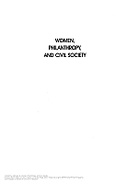Explore

Women, Philanthropy, and Civil Society
0 Ungluers have
Faved this Work
Login to Fave
This volume, which grows out of a research project on women and philanthropy sponsored by the Center for the Study of Philanthropy at the City University of New York, expands our understanding of female beneficence in shaping diverse political cultures. The contributors examine the role of philanthropy, the giving of time, money, and/or valuables for public benefiting shaping nongovernmental organizations (NGOs), civil society, and women's political culture world-wide. As in the United States, this activity often enabled women to create parallel power structures that resembled, but rarely replicated, the commercial and political arenas of men. From nuns who managed charitable and educational institutions to political activists demanding an end ot discriminatory practices against women and children, many of the women whose lives are documented in these pages claimed distinctive public roles through the nonprofit sphere. The authors are from Europe, the United States, Latin America, the Middle East, Egypt, India, and Asia. Their essays cover nations on every continent, representing a variety of political and religious systems. In approaching the subject of women as shapers of civil society, each of the contributors shares certain basic understandings of the environment in which civil society is formed. For example, they report that public-private partnerships are pervasive in both decentralized states such as the United States and highly centralized ones such as France. They discuss how in the 19th century private donations and volunteerism were forms of invisible political activity for women that functioned as a form of subsidy to state programs. Often, the roots of state welfare organizations lay in volunteer and religious institutions and that women acted on behalf of the state in caring for those in need. Colonialism may have helped foster local women's voluntary organizations; elsewhere the consolidation of nation-states effectively suppressed the activities of volunteer or nongovernmental activities in favor of state approved aid. The resurgence of NGOs in the 1980s and 1990s has been fueled in part by women's organizations and the rise of feminist agendas. Certainly, the essays in this book suggest that their influence has been pervasive. The research reported here also reveals previously hidden roles played by elite and middle-class women in creating wealth and providing services. Often these services were delivered through religious organizations, though each religious tradition fostered distinct cultures of giving, and religion is important in all of these essays. The essays in this book illustrate the extent to which government, the market, and religion have shaped the role of female philanthropy and philanthropists in different national settings. By shifting the focus from organizations to donors and volunteers, they begin to assess the relative importance of each of these factors in creating opportunities for citizen participation, as well as the role of female philanthropy in opening a space for women in the public sphere.
This book is included in DOAB.
Why read this book? Have your say.
You must be logged in to comment.
Rights Information
Are you the author or publisher of this work? If so, you can claim it as yours by registering as an Unglue.it rights holder.Downloads
This work has been downloaded 80 times via unglue.it ebook links.
- 24 - epub (CC BY-NC) at Unglue.it.
- 56 - pdf (CC BY-NC) at Unglue.it.
Keywords
- American Studies
- gender
- Gender studies, gender groups
- History
- Philanthropy
- Philanthropy Politics
- Politics
- Social groups
- Society & culture: general
- Society & Social Sciences
- thema EDItEUR::J Society and Social Sciences::JB Society and culture: general::JBS Social groups, communities and identities::JBSF Gender studies, gender groups
- Women
Links
DOI: 10.2979/WomenPhilanthropyandEditions

